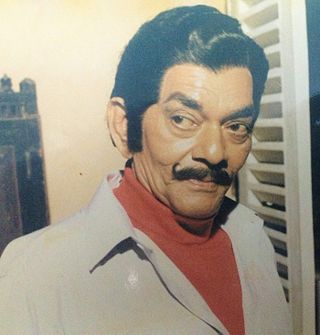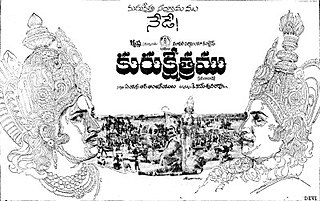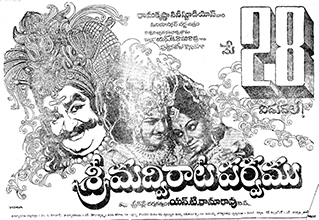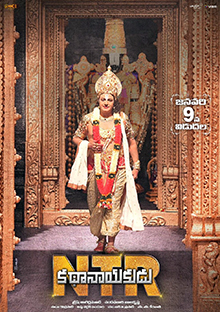Related Research Articles

Nandamuri Taraka Rama Rao, often referred to by his initials NTR, was an Indian actor, film director, film producer, screenwriter, film editor, philanthropist and politician who served as a former Chief Minister of Andhra Pradesh for seven years over three terms. He is regarded as one of the most influential actors of Indian cinema. He starred in over 300 films, predominantly in Telugu cinema, and was referred to as "Viswa Vikhyatha Nata Sarvabhouma". Rao received three National Film Awards for co-producing Thodu Dongalu (1954) and Seetharama Kalyanam (1960) under National Art Theater, Madras, and for directing Varakatnam (1970). In 1968, The Government of India honoured him with Padma Shri, the fourth-highest civilian award, for his contributions to Indian cinema. In 2013, Rao was voted as "Greatest Indian Actor of All Time" in a CNN-IBN national poll conducted on the occasion of the Centenary of Indian Cinema.

Daana Veera Soora Karna is a 1977 Indian Telugu-language Hindu mythological film co-written, produced and directed by N. T. Rama Rao under his banner Ramakrishna Cine Studios. Based on the life of Karna from the Mahabharata, the film stars Rama Rao in three roles: the title character Karna, Duryodhana, and Krishna. The music was composed by composed by Pendyala Nageswara Rao.

Nandamuri Balakrishna also known as Balayya or NBK is an Indian actor, film producer and politician known for his works in Telugu cinema. Balakrishna is an elected member of the Andhra Pradesh Legislative Assembly from Hindupuram constituency since 2014. The sixth son of actor and former Chief Minister of Andhra Pradesh N. T. Rama Rao, Balakrishna made his debut as a child artist at the age of 14 with the film Tatamma Kala (1974). Balakrishna is a recipient of three state Nandi Awards, three SIIMA Awards, and the IIFA Award. In 2012, Balakrishna was the chief guest at the 43rd IFFI. Currently, he serves as the Chairman of Basavatarakam Indo-American Cancer Hospital and Research Institute in Hyderabad.

Arudra was an Indian author, poet, lyricist, translator, publisher, dramatist, playwright, and an expert on Telugu literature. He is also known for his works in Telugu cinema as a lyricist, dialogue writer, and story writer. He received the Sahitya Akademi Award in 1987.

Adavi Ramudu is a 1977 Indian Telugu-language action film directed by K. Raghavendra Rao. The film stars N. T. Rama Rao, Jayaprada and Jayasudha, with supporting roles played by Nagabhushanam, Satyanarayana, Gummadi and Jaggayya. The film was edited by Kotagiri Venkateswara Rao, with music composed by K. V. Mahadevan and cinematography by A. Vincent.

Ghattamaneni Siva Rama Krishna Murthy, known mononymously as Krishna, was an Indian actor, film director and film producer known for his work predominantly in Telugu cinema. In a career spanning more than five decades, he starred in over 350 films in a variety of roles. He is referred to as "Superstar" and "Nata Sekhara" in the Telugu media. In 2009, for his contributions to Indian cinema the Indian government awarded him the Padma Bhushan, the third-highest civilian award in the country. He was elected as a Member of Parliament for the Congress party in 1989. In 1997, he received the Filmfare Lifetime Achievement Award – South in addition to Honorary doctorate from Andhra University in 2008. He died on 15 November 2022 due to cardiac arrest.

Nandamuri Harikrishna was an Indian politician, actor, and film producer. He served as the Member of Parliament in the Rajya Sabha, the upper house the Indian Parliament representing the Indian state of Andhra Pradesh from 2008 to 2013 and a member of the Andhra Pradesh Legislative Assembly from 1996-1999. His film works were predominantly in Telugu cinema. Harikrishna was the fourth son of actor and former chief minister of Andhra Pradesh, N. T. Rama Rao. His sons N. T. Rama Rao Jr. and Nandamuri Kalyan Ram are actors and daughter Nandamuri Venkata Suhasini is a politician.
Dhulipala Sitarama Sastry, known mononymously by the surname Dhulipala, was an Indian actor and thespian, known for his works predominantly in Telugu cinema. He was noted for playing mythological roles, particularly the role of Shakuni. He began his acting career at the young age of 13 and went on to work in about 300 films. He shot to fame with Bhishma and Sri Krishna Pandaveeyam, acting alongside N. T. Rama Rao.

Rajanala Kaleswara Rao, known mononymously by his surname as Rajanala, was an Indian actor known for his works predominantly in Telugu cinema, Telugu theatre, and a few Tamil, Kannada, and Hindi films. In a film career spanning more than four decades, Rajanala acted in more than 1400 feature films in a variety of characters. Regarded as one of the finest method actors, Rajanala was known for his gruesome portrayals of lead antagonist roles during the Golden age of Telugu cinema. The Government of Andhra Pradesh and the film industry felicitated him for his achievements and contribution to Indian Film Industry. He won several Filmfare Awards South and Nandi Award.

Sri Krishna Rayabaram is a popular Telugu drama written by Tirupati Venkata Kavulu in the early 20th century. It was made into a Telugu film in 1960. Many actors and companies have staged this production throughout Andhra Pradesh, India, and abroad.

Sri Madvirat Veerabrahmendra Swami Charitra is a 1984 Indian Telugu-language biographical film, based on life of Pothuluri Veerabrahmam, produced and directed by N. T. Rama Rao under his Ramakrishna Cine Studios banner. N. T. Rama Rao portrayed the characters of Gautama Buddha, Vemana, Ramanuja, Adi Shankara along with the title role. It stars Nandamuri Balakrishna, Rati Agnihotri and Kanchana with music composed by Susarla Dakshinamurthi. Actually, shooting of the film was completed by 1981, but the release got delayed due to objection from the censor board asking to delete a few scenes from the movie, to which NTR did not agree and immediately took the matter to court and finally got it released in November 1984.

Chanakya Chandragupta is a 1977 Indian Telugu-language historical drama film produced and directed by N. T. Rama Rao under the banner of Ramakrishna Cine Studios. The film features Akkineni Nageswara Rao, N. T. Rama Rao, Sivaji Ganesan, Jayapradha, Manjula and Kaikala Satyanarayana in prominent roles, with music composed by Pendyala Nageswara Rao.
Rajasree, also known as Rajasri or Rajashri, is an Indian actress active from 1956 to 1979. She is particularly famous for her portrayal as a princess in several folklore Telugu movies opposite N. T. Rama Rao and Tadepalli Lakshmi Kanta Rao and for acting alongside Ravichandran in the Tamil comedy films Neeyum Naanum, Kadhalikka Neram Illai and Delhi Mappilai. Notable among Rajasri's roles in non-folklore social films in Tamil are as Nimmi in the Tamil hit comedy film Kaadhalikka Neramillai, remade as Preminchi Choodu in Telugu, as movie star Bhama in Tamil film Bama Vijayam. She was credited as Gracy in the Malayalam movies she starred in her career since her debut film Bharya (1962), directed by Kunchako. Rajasree went on to do 200 films spread across the languages – Telugu, Tamil, Kannada, Malayalam and Hindi from beginning of 1956 to 1979.
Pudipeddi Jogeswara Sarma was an Indian film dubbing artist, turned actor and writer, known for his works predominantly in Telugu cinema. He has worked for over 500 films as an actor and dubbing artist. He is the father of actors P. Sai Kumar, P. Ravi Shankar and Ayyappa P. Sarma.

Mikkilineni Radhakrishna Murthy was an Indian actor and thespian known for his works predominantly in Telugu cinema. He was the founder of the theater group Praja Natya Mandali. He has received the honorary Kalaprapoorna from Andhra University, for his contributions towards Telugu theater and cinema.

Kurukshetram is a 1977 Indian Telugu-language Hindu mythological film directed by Kamalakara Kameswara Rao. The film features an ensemble cast that includes Krishna, Sobhan Babu, Krishnam Raju, Jamuna, and Vijaya Nirmala. It was produced by A. S. R. Anjaneyulu, with Krishna serving as the presenter. The screenplay was written by Samudrala Jr., while the dialogues were penned by Tripuraneni Maharadhi. Notable supporting roles were played by Kaikala Satyanarayana, Anjali Devi, Jayaprada, Gummadi, and Chandra Mohan. The music was composed by Saluri Rajeswara Rao.

Srimad Virata Parvam is a 1979 Telugu-language Hindu mythological film, produced and directed by N. T. Rama Rao under his Ramakrishna Cine Studios banner. It stars N. T. Rama Rao, Vanisri, Nandamuri Balakrishna and music composed by Susarla Dakshina Murthy. The film is based on Virata Parva from epic Mahabharata in which NTR has performed 5 pivotal roles, after blockbuster success of Daana Veera Soora Karna (1977), in which he emoted 3 different roles. It is a color remake of the 1966 movie Nartanasala both starring N.T.Rama Rao as Arjuna.
Prabha is an Indian actress and Kuchipudi dancer from Andhra Pradesh. She has acted about 125 films in Telugu, Tamil, Malayalam and Kannada alongside popular Tollywood actors such as N. T. Rama Rao and Akkineni Nageswara Rao.She won two Nandi Awards.

NTR: Kathanayakudu is a 2019 Indian Telugu-language biographical drama film based on the real life and acting career of N. T. Rama Rao (NTR). It was directed by Krish Jagarlamudi and produced by Nandamuri Balakrishna, Sai Korrapati, Vishnu Vardhan Induri under NBK Films, Vaaraahi Chalana Chitram, Vibri Media banners. It is the first installation of a two-part film. The film stars an ensemble cast with Nandamuri Balakrishna, as his father N. T. Rama Rao, Vidya Balan in lead roles. Music is composed by M. M. Keeravani. The film has a sequel, NTR: Mahanayakudu, that showcases the political journey of Rama Rao.
Kondaveeti Venkatakavi is an Indian poet, scholar, and scriptwriter from Andhra Pradesh. He served as the Principal of a Sanskrit college. He is best known for writing the dialogues in the film Daana Veera Soora Karna (1977).
References
- 1 2 Madhuri, Dasagrandhi (8 July 2018). "Where the magic gets unfolded". Telangana Today . Archived from the original on 2 November 2019. Retrieved 2 November 2019.
- ↑ "Celeb of the Week - Sri N T Rama Rao". Idlebrain.com . Archived from the original on 14 April 2016. Retrieved 14 April 2016.